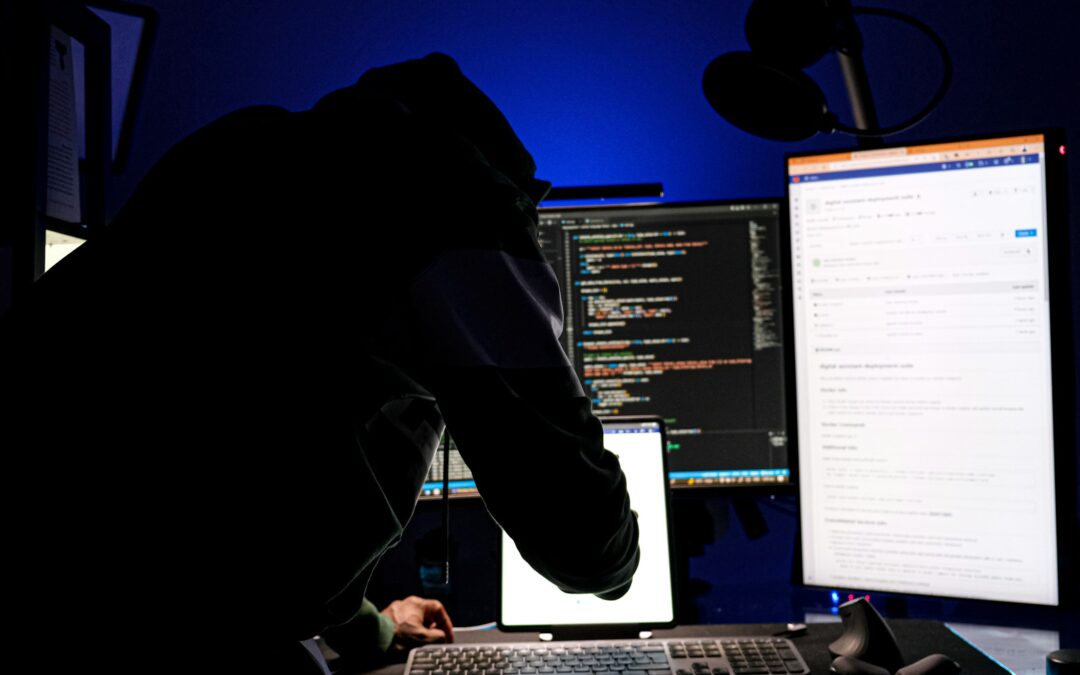On January 23, 2025, the Bundeswehr University Munich was the victim of a cyberattack. The hackers gained access to a central IT service at the data center. This incident is part of a worrying trend: Hacker attacks on universities are on the rise.
The cyberattack on the University of BW Munich affected sensitive data. Real names, addresses, login data, account and cell phone numbers as well as email addresses were compromised. Course content was also affected. The Computer security of the university faced an enormous challenge.
Founded in 1973, the University of the Federal Armed Forces in Munich is a strategic target. Experts suspect that states such as Russia or China could be behind such attacks. The incident raises questions about digital security in higher education.
Important findings
- Cyber attack on the University of the Federal Armed Forces Munich on January 23, 2025
- Sensitive data such as real names and account information affected
- Suspected state-directed cyberattack
- Increasing threat to universities from hacker attacks
- Need for improved Computer security in the education sector
Background to the cyberattack on the University of BW Munich
The IT security universities is facing major challenges. The cyber attack on the University of the Federal Armed Forces in Munich shows the increasing threat to academic institutions. Since the beginning of January, hacker groups on the dark web have increasingly been presenting successful attacks on German companies and infrastructures.
An overview of the incidents
The attack on the University of BW Munich is part of a worrying trend. In 2016, the German Federal Office for Information Security (BSI) registered over 400 attacks on government networks every day. About 20 of them were highly specialized and could only be detected manually. The Cyber defense of academic institutions has to deal with a growing threat.
Universities are attractive targets for hackers. They hold valuable research data and personal information. The methods of attack are becoming increasingly sophisticated. For example, an attack on the Democratic National Committee (DNC) resulted in the publication of over 19,000 internal emails. The German Bundestag was also the target of cyberattacks in 2015 and 2016.
The University of the Federal Armed Forces in Munich reacted quickly to the attack. It activated its emergency management system and informed the relevant authorities. The exact effects and extent of the damage are still being investigated. This incident underlines the need for increased IT security measures at German universities.
The impact of the attack on the university
The cyberattack on the Bundeswehr University Munich, discovered on January 23, 2023, had far-reaching consequences for the education sector. The full extent of digital crime in the education sector is revealed here and underlines the importance of cyber protection for university networks.
Impairment of teaching operations
The attack hit the university hard and caused considerable disruption to teaching. Degree courses such as computer science and cyber security were particularly affected. Access to digital learning platforms and online lectures was restricted, which severely disrupted everyday student life.
Although no data deletion or unauthorized encryption was detected, the incident caused uncertainty. Particularly explosive: some of the students are intended for the Federal Intelligence Service or are already working there.
| Aspect | Impact |
|---|---|
| Duration of the undetected attack | 3 weeks |
| Study programs affected | Information technology, cyber security, intelligence services |
| Data at risk | Account details, cell phone numbers |
| Damage detected | No data deletion or unauthorized encryption |
The university must now revise its security protocols. The collaboration with the Bundeswehr's Cyber Innovation Hub is intended to provide innovative solutions for digitalization and improved protection against digital crime in the education sector.
Reactions from the university
The University of the Federal Armed Forces in Munich reacted promptly to the cyber attack. It immediately put its prepared emergency plans into effect in order to protect the to ensure information security for students and data protection in the scientific institution.
Quick measures
Last Monday, the university activated its emergency protocols. These steps show how seriously the university is taking the threat and how important it is to protect sensitive data.
The university management issued an official statement demonstrating transparency and determination. It provided information about the incident and the protective measures taken.
| Measure | Goal |
|---|---|
| Activation of the emergency plans | Rapid response to the attack |
| Official statement | Transparent communication |
| IT security check | Identification of weak points |
| Training for employees | Strengthening safety awareness |
The university emphasized that protecting the data of students and researchers is a top priority. It is working closely with experts to improve the security of its systems and prevent similar incidents in the future.
Cyberattacks in higher education: A trend?
The cyber attack on the University of BW Munich is not an isolated incident. The digital transformation in the education sector has made universities attractive targets for cybercriminals. Especially during the COVID-19 pandemic, when online teaching became the norm, the number of attacks increased dramatically.
Frequency and type of attacks
Statistics show that 60% of higher education institutions saw an increase in cyberattacks during the transition to distance learning. Phishing attacks on educational institutions increased by 50% in the first half of 2020. Alarmingly, 30% of institutions experienced data leaks exposing sensitive student information.

Penetration tests of academic IT systems are becoming increasingly important. These tests simulate real attacks and uncover vulnerabilities. After the Cyber attack on the University of BW Munich many universities have strengthened their security measures. 80% of institutions have introduced additional cyber security training for staff and students.
The average recovery time after a cyber incident is around 21 days. This underlines the need for robust security systems and well-prepared response plans. Universities need to invest in their Digital infrastructure to defend against future attacks and protect the integrity of their academic systems.
The role of IT security
The Cyber attack on the University of the Federal Armed Forces Munich illustrates the critical importance of IT security universities. Universities with sensitive data and research projects are particularly attractive targets for cyber criminals. The university's security infrastructure was called into question by the attack, even though it offers courses in computer science and cyber security.
Experts emphasize the need to continuously improve IT security measures. The Cybersecurity university networks must meet the growing complexity digital threats do justice to them. This requires not only technical solutions, but also a comprehensive strategy for preventing and defending against cyber attacks.
Preventive measures
In order to Digital infrastructure universities should take the following preventive measures:
- Carry out regular safety audits
- Implement robust firewalls and antivirus software
- Use encryption technologies for sensitive data
- Training employees and students in IT security
- Strengthen access control systems
The University of the Federal Armed Forces is now facing the challenge of modernize IT infrastructure and make it more resilient to cyber threats to make. This is an important step towards building trust in the IT security universities and prevent future attacks.
Perpetrators and motives behind cyber attacks
The world of Hacker attacks at universities is complex and multi-layered. Since the 1990s, the increasing use of computers has made the risk of cyber attacks ubiquitous. The perpetrators behind this digital crime in the education sector are often difficult to catch.

Profile of the attackers
The attackers can be roughly divided into three categories:
- Individual hackers: Often motivated by personal challenges or curiosity.
- Organized criminals: aim for financial gain.
- State-sponsored groups: Engage in espionage or pursue political goals.
The Federal Office for the Protection of the Constitution (BfV) has set up a "Quick Reaction Force" to carry out analyses in the event of specific attacks. This underlines the seriousness of the threat posed by Hacker attacks at universities.
Compromised access data can be used criminally or be a gateway for sabotage and espionage. They are part of the hybrid warfare to which Germany is exposed.
Digital crime in the education sector has a wide range of effects From Data loss and even system failures the consequences can be serious. It is particularly worrying that around 30-40% of teenagers and young adults in Germany have already been victims of cyberbullying - a form of digital crime that is particularly prevalent in the education sector.
Emergency management and crisis communication
In times of increasing cyber attacks on academic institutions, effective emergency management is becoming increasingly important. The University of the Federal Armed Forces Munich reacted promptly by activating its prepared emergency plans last Monday. This underlines the importance of a well-structured cyber defense for academic institutions.
Strategies for emergencies
Successful crisis management requires clear strategies. Krisennavigator, an institute for crisis research, has been providing expertise in this area since 1998. For universities, it is crucial to isolate systems, inform authorities and restore data from backups. The focus is on information security for students.
The Crisis Communication Summit 2024 in Munich offers a platform for exchanging current strategies. With 14 renowned speakers, solutions against loss of trust will be presented - an important aspect for the cyber defense of academic institutions.
"Crisis mode" was chosen as the word of the year 2023 - a sign of the growing importance of crisis management in all areas.
For effective crisis communication, it is important to inform all parties involved - students, employees and the public - promptly and transparently. This strengthens trust and helps to minimize the impact of a cyberattack.
Lessons learned from the incident
The cyberattack on the University of the Federal Armed Forces in Munich has underlined the urgency of penetration testing academic IT systems. This experience shows how important it is to identify and rectify vulnerabilities at an early stage.
Opportunities for improvement for the university
In order to Cybersecurity university networks the university should take the following measures:
- Carry out regular safety audits
- Employee training on the topic of IT security intensify
- Increase investments in modern security technologies
- Strengthen cooperation with experts for penetration testing of academic IT systems
The Bundeswehr University Munich can learn from this incident to improve its digital infrastructure. An increased focus on the Cybersecurity university networks is essential to ward off future attacks.
According to current statistics, the probability of cyber attacks on public institutions has increased by 300% in the last five years. This highlights the need to invest in cyber security. The university should join the trend: 60% of German companies report at least one cyberattack in 2022.
The lessons learned from this incident can serve as a catalyst for improvement. By implementing these measures, the university can improve its Digital resilience and be better prepared for future challenges.
Legal consequences of cyber attacks
Cyber attacks on scientific institutions have considerable legal consequences. Data protection is at the heart of this. Universities must take strict security measures to protect the personal data of students and employees.
Data protection rights and reporting obligations
In the event of data protection breaches, universities are obliged to inform the data subjects and supervisory authorities. The Computer security plays a key role in preventing such incidents. Experts warn of the risks of Ransom payments after cyber attacks:
- 42% of German companies pay ransom
- Average payment: over 250,000 euros
- Payments finance criminal organizations
Germany's cyber security strategy emphasizes the shared responsibility of the state, business and society. It aims to strengthen digital literacy and promote secure electronic identities.
In order to improve computer security, the government is planning to expand IT security research and set up a national cyber defense center. These measures are intended to Strengthening data protection in scientific institutions and legal consequences of cyber attacks minimize.
| Measure | Goal |
|---|---|
| Promotion of digital competence | Reduction of digital carelessness |
| Strengthening the certification processes | Improving IT security |
| International cooperation | Strengthening law enforcement |
Support for those affected
Following the cyber attack on the University of the Federal Armed Forces Munich on January 23, the focus is on supporting students and employees. The information security of students is a top priority, especially in view of the degree programs offered in computer science and cyber security.
Offers of help for the university community
The university offers comprehensive support:
- Psychological counseling for stress reduction
- Technical help for data backup
- Information events on cyber defense
- Individual advice on data protection issues
For the cyber defense of academic institutions, it is crucial that those affected are supported quickly and effectively. The university has set up a hotline to answer questions about potentially affected personal data such as account details and cell phone numbers.
| Support offer | Availability | Target group |
|---|---|---|
| Psychological counseling | Monday-Friday, 9 a.m.-5 p.m. | All members of the university |
| IT helpdesk | 24/7 | Students and employees |
| Data protection consultation | Tuesday and Thursday, 10-12 a.m. | Affected by the cyberattack |
The close cooperation with the Federal Ministry of Defense and the Cyber Innovation Hub (CIHbw) further strengthens the academic institution's cyber defense. These collaborations aim to develop and implement innovative information security solutions for students.
Outlook on digital security in universities
IT security at universities is facing major challenges. The annual conference of the Research Institute Cyber Defense and Smart Data (FI CODE) shows how important the topic is. Innovative solutions for cyber security were supported with prize money of 39,000 euros. This underlines the need for new approaches to digital security in academia.
In the future, penetration tests will play a greater role in the academic environment. These tests help, Vulnerabilities in IT systems to find and remedy them. The Bundeswehr University Munich offers a Master's program in Cyber Security on. Students learn how to protect IT systems and defend against attacks. The program comprises 90 ECTS credits and can be completed on a full-time or part-time basis.
Innovative approaches for greater safety
The CODE Annual Conference 2023 will provide new impetus for IT security at universities. Experts from business, politics and research will discuss current trends. One focus will be on networking different specialist areas. This will result in holistic security concepts for universities. The future of digital security at universities depends on this collaboration.
